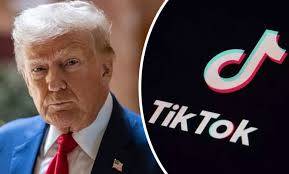Former U.S. President Donald Trump has made a surprising move by urging the U.S. Supreme Court to delay its ruling on the impending TikTok ban. This development comes as Trump seeks more time to broker a political solution to the contentious issue.
The Legal Tussle: Ban or Divest?
At the heart of the dispute is a U.S. law requiring TikTok's Chinese parent company, ByteDance, to sell its American operations to a U.S.-based entity. Failure to comply would result in a nationwide ban set to take effect on January 19—just one day before President-elect Trump assumes office.
The U.S. government has argued that ByteDance’s alleged ties to the Chinese government pose a national security risk. ByteDance, however, denies these allegations, asserting that the law infringes on free speech rights. Despite several legal challenges, ByteDance and TikTok have struggled to overturn the legislation, leaving the Supreme Court as their final recourse.
Trump's Surprising Stance
In a legal filing submitted on Friday, Trump’s lawyer stated that the former president is opposed to the ban and favors resolving the matter politically. The brief highlights the tension between safeguarding free speech and addressing national security concerns.
Trump emphasized that delaying the January 19 deadline would provide him with the opportunity to negotiate a resolution, potentially averting the need for court intervention.
Bipartisan Concerns and TikTok's Legal Struggles
The law mandating TikTok's divestiture was passed with bipartisan support in Congress and signed into law by President Joe Biden earlier this year. State attorneys general, led by Montana's Austin Knudsen, have also urged the Supreme Court to uphold the legislation.
Earlier this month, a federal appeals court rejected an attempt to overturn the law, stating it was the result of “extensive, bipartisan action by Congress and successive presidents.â€
TikTok’s Popularity and Political Implications
TikTok has amassed a staggering 170 million users in the United States, making its potential ban a hot-button issue. Trump himself acknowledged TikTok’s influence, claiming it helped him secure significant youth support in the 2020 election, though polling data suggests otherwise.
Trump recently met with TikTok CEO Shou Zi Chew at his Mar-a-Lago estate in Florida, further signaling his interest in finding an alternative to the outright ban.
What’s Next?
The Supreme Court is scheduled to hear arguments on January 10, marking a critical juncture in the saga. If the deadline is not extended, the TikTok ban could go into effect just before Trump officially assumes office.
While Trump’s appeal for a delay adds an unexpected twist, the broader implications of the case—spanning free speech, national security, and international relations—ensure it will remain a focal point in the weeks to come.
Your Turn: What Do You Think?
Do you believe TikTok poses a national security risk, or is this primarily a free speech issue? Should the U.S. government prioritize a political resolution over legal action? Share your thoughts below!




No comments yet
Be the first to share your thoughts!